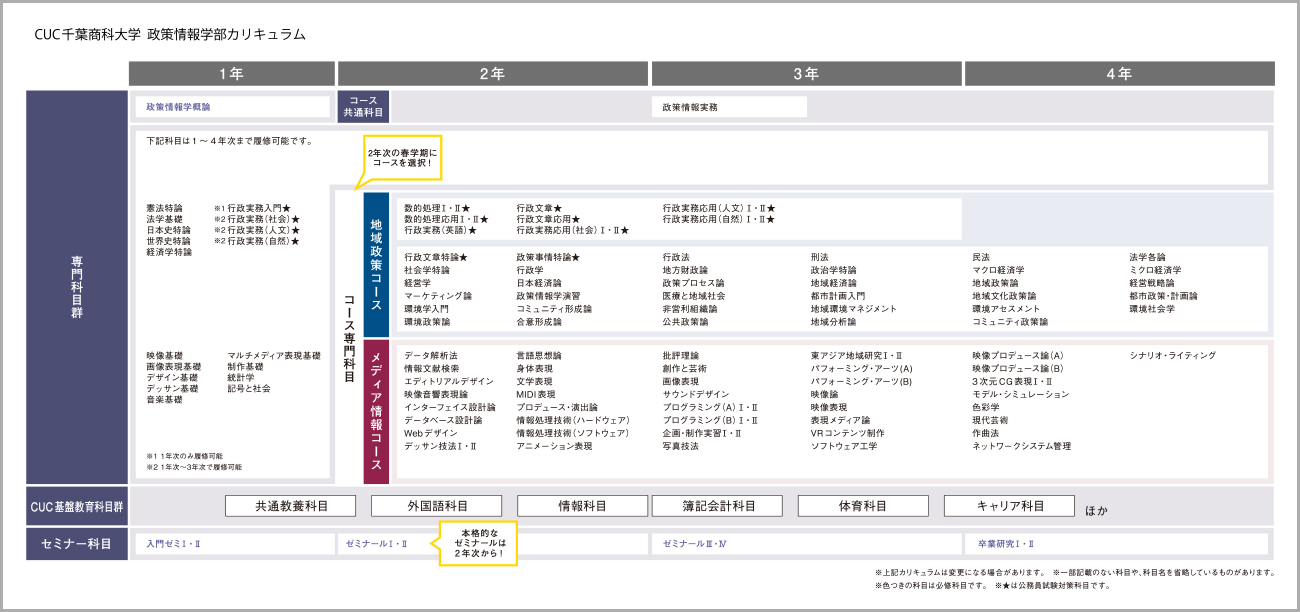A curriculum that allows you to learn freely across disciplines. Experience many different worlds and discover your future path.
Urban development, environmental issues, web programming, art, animation...
The curriculum of the Faculty of Policy and Information Studies exposes you to a wide range of fields, opening up new worlds for you.
Our school not only offers classes in the classroom, but also provides opportunities for active learning through fieldwork, project-based classes, and other activities that take students out into the world.
In order to solve complex social problems, we offer courses that will help students broaden their perspective, view society in an accurate manner, and develop the skills to implement solutions that utilize wisdom from a variety of fields.
Click on the image to open a PDF of the curriculum.
Curriculum Features
Basic introductory education to sharpen your perspective on society
What is the problem now? The ability to look around and notice the problem is the first step to creating a better society. In the School of Policy and Information Studies, we deepen your knowledge through thorough introductory education and hone your perspective on society.
[Basic academic ability]
We develop basic academic skills that are useful in society, such as "Introduction to Policy Informatics" to understand society in a broad sense, and "Introduction to Administrative Practice" to learn the basics of language and non-language fields.
[Research capabilities]
Introductory seminars teach how to conduct research at university. Students will split into teams and work on collaborative research, learning the process of research from setting a research topic to conducting research and presenting.
[Information power]
We provide comprehensive support tailored to your interests and level, from learning how to use business software to programming, web design, and app development, so that anyone can master the latest IT environment.
Practical skills for society
Problems are not occurring in the classroom, but in society. The curriculum is characterized by its high level of practicality, where students actively go out into the city and put what they learn in the classroom into practice while discussing with their peers.
[Thinking ability]
Seminars are small classes divided by research theme. Through literature research, discussions, report writing, etc., students develop the ability to think deeply about a single theme.
[Ability to act]
We offer a wide range of classes that enhance students' ability to take action, such as "active learning," in which students put the knowledge they gained in the classroom to the test in local communities and activities, and "fieldwork," in which students conduct research in the city or in nature.
[Communication skills]
We provide plenty of opportunities for students to communicate their ideas while understanding others, such as through teamwork in active learning and presentations in seminars.
Graduation Requirements and Degrees Available
A total of 124 credits are required for graduation.
Graduation Requirements and Degrees Available
Early Graduation System
The Faculty of Policy and Information Studies has implemented an early graduation system that allows outstanding students who wish to proceed to graduate school to graduate after three or more years of study.
Early graduation is available to students who meet certain requirements, such as being allowed to register their desire to graduate early at the end of their second year and having confirmed their intention to advance to graduate school at the end of their third year. Early graduation and advancement to graduate school makes it possible to earn a master's degree in five years from undergraduate enrollment, and is a system that supports the realization of the dreams of students who are determined to advance their careers in the real world from an early stage.
Related links
